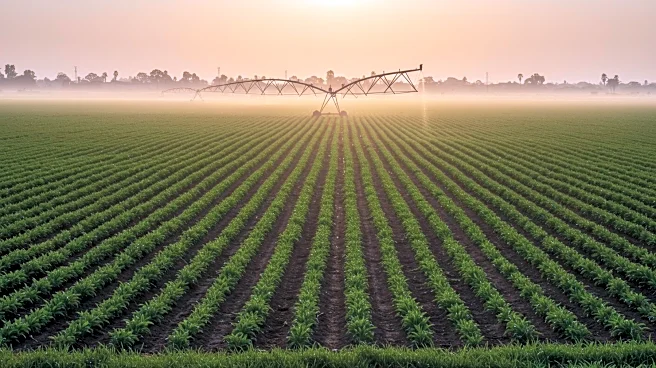What is the story about?
What's Happening?
Kerala's Chief Minister Pinarayi Vijayan announced that the state's agricultural sector has achieved a growth rate of 4.65%, more than double the national average of 2.1%. This announcement was made during the online state-level celebration of Farmers’ Day. The state has implemented several initiatives, including Mission 2026 and Mission 2033, aimed at increasing farmers' income by 50%. Additionally, a comprehensive crop insurance scheme has been introduced. The state has seen significant improvements in paddy productivity and coconut cultivation, with the latter achieving a 54% growth through the Keragramam project. However, challenges such as climate change, market uncertainties, and wild animal attacks continue to affect the sector. To address these, the state is implementing the KERA Project with World Bank support, benefiting a large number of farmers.
Why It's Important?
The growth in Kerala's agricultural sector is significant as it highlights the effectiveness of targeted government interventions in boosting agricultural productivity and farmer income. This development is crucial for the state's economy, which relies heavily on agriculture. The initiatives could serve as a model for other states facing similar challenges. The involvement of the World Bank in the KERA Project underscores the importance of international collaboration in addressing climate change impacts on agriculture. The success of these programs could lead to increased food security and economic stability for farmers, while also promoting sustainable agricultural practices.
What's Next?
The Kerala government plans to continue integrating modern technologies with traditional farming practices to further enhance agricultural productivity. The state is also focusing on branding agricultural value-added products, with over 200 products prepared for marketing. Efforts to curb wild animal attacks require amendments to central laws, and the state government is pressuring the Centre for these changes. The success of these initiatives could lead to further investments in agritech start-ups and innovations in value-added production, potentially transforming the agricultural landscape in Kerala.
Beyond the Headlines
The emphasis on combining traditional and modern agricultural practices reflects a broader trend towards sustainable farming. The Kerala government's approach could influence national agricultural policies, especially in terms of climate adaptation strategies. The focus on value-added products aligns with global trends towards enhancing agricultural value chains, which can lead to increased profitability for farmers. The state's proactive stance in seeking legislative changes to address wild animal threats highlights the complex interplay between agriculture and wildlife conservation.

















